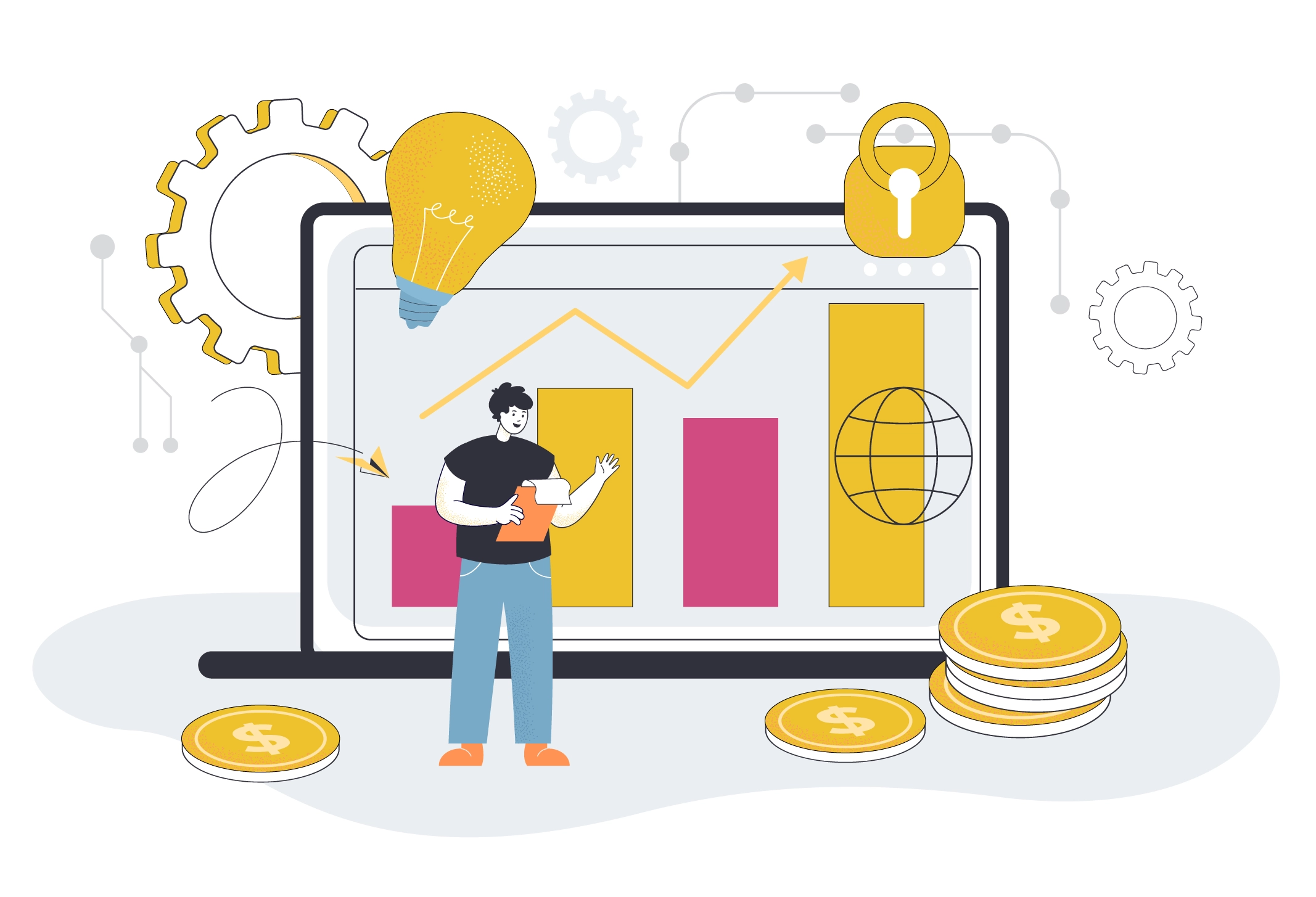Raining about the Marvels of Data Science in Finance Industry
Data Science in finance presently has surfaced all over the industry as we all are aware, and the process typically involves gaining insights about the application of various data analysis techniques, machine learning algorithms, and statistical methodologies to make predictions and informed decision-making in the financial industry. But before discussing more data science in the fintech industry let’s first gain a handfist of knowledge about what exactly data science refers to. Data Science refers to the mixture of math and statistics that holds a specialization in programming, advanced analytics, artificial intelligence, and machine learning with specific subject matter that unfolds all the actionable insights that are secretly hidden in an organization’s data.

As the industry is constantly moving at a McQueen lighting pace, the financial industry started adopting data science to improve their overall decision-making, reducing the risk that is related to financial institutions and increasing efficiency. Moreover, with this adoption in the financial industry, data science brings a profusion amount of benefits which we will be discussing further in this blog. One interesting fact about the data science and finance industry is their capabilities toward algorithmic trading are so advanced that now financial institutions can integrate all the complex algorithms to make high-speed trading decisions which are based on real-time market data, news events, and several other factors.
Now you must know how data science can play a vital role in the fintech industry. But if you wish to gain more knowledge about how data science works in the fintech industry, then you are at the right platform! In this blog, we have penned down our thoughts about data science in the financial industry, how it is used, the added benefits that brings to the table of data science, and roles and responsibilities! Further, we will be dealing with some basic examples of data science in finance to see where data science has been used. So without any further ado, let’s jump into this topic to learn more about it!
Understanding the Leap of Data Science for the Fintech Industry
Nowadays, the challenges faced by many financial industries are the primary concern for the majority of financial data scientists. But as the emergence of data science has paved its way, the finance industry can now focus more on making informed decisions and managing risks. Majorly in finance firms, the data are generated daily from the movement of the market, transactions, customer interactions, and so on, data offers unparalleled opportunities for extracting all the insights hence driving innovation. Moreover, the use of data science and finance is all about implementing advanced statistical machine learning techniques and tips to organize all the data to derive the financial results.

One of the prime applications of data science in finance is predictive modeling. By integrating all the advanced statistical techniques and machine learning algorithms, financial institutions can forecast market trends, customer behavior, and even all the potential risks. Predictive models help in making informed investment decisions, optimizing all trading strategies, and identifying growth opportunities. The data scientist makes use of data science to build a data pipeline and implement all the machine learning models to create visualization reports to communicate all the extracted insights from the vast amounts of data that are collected by the organization that wants to make use of these extracted data insights.
Charting the Question; How is Data Science Used in Finance?
Now let’s move forward in discussing how data science for fintech is used. Imagine a situation here where you can see your future and predict the risk that might come towards you shortly. That’s how data science plays a vital role in the fintech industry by analyzing the market data and customer behavior to predict all the potential risks. It is more like protecting or shielding the financial firms from the market risks.
Moreover, data science uses a technique like machine learning to analyze all these risks to manage them associated with investments, loans, and other financial activities. Another is via algorithmic trading which uses strategies that automatically execute trades based on predefined criteria, leveraging historical data, market trends, and other factors.

These help the financial industry to make all the firm decisions to keep all the traders ahead in the competition. Also with the help of advanced algorithms, all the fraudulent activities can be detected by monitoring all the transactional data and identifying anomalous patterns or behaviors. Data science can also be implemented to optimize all investment portfolios by analyzing historical performance, predicting future trends, and identifying the most suitable asset for allocation strategies which is based on risk appetite and investment goals and so on.
Moreover, data science helps financial institutions make sure that all regulatory compliance is automated in an efficient manner like reporting, monitoring transactions for suspicious activities, and analyzing large volumes of data to identify potential compliance issues.
Enrich the Benefits of Using Data Science in Finance
Data Science for fintech brings a lot of benefits to the plate, the first added benefit is data science can improve the sales and revenue of the company to increase the overall customer interaction with high-quality connections. Data Science allows companies to check whether their customers are experiencing improvements or not. This entirely helps to uncover all the new levels of personalization customer experience. Also, financial data analysts can monitor consumer behavior and generate all the valuable insights that various companies offer to their clients in the real world. Moreover, this helps financial institutions to apprehend how customers are likely to behave presently and how much they will generate in the future to gain better insights.
One more added benefit is that data science offers the development of all the complex investment models that implement all the historical data, market trends, and several other factors to optimize the investment rate and strategies to maximize returns. Moreover, the financial institution can customize their offering and all marketing messages, and customer service experiences eventually lead to higher customer satisfaction and gain more loyalty.
Additionally, one more added benefit is that data science in finance industry can assay the historical data and identify the patterns for better risk management and mitigation strategies that lead to more risk management practices. Also, data science automates all the repetitive tasks like collecting the data, analyzing, and reporting frees up time for all the financial professionals to majorly focus on higher-value activities that overall improve operational efficiency.
Coursing the Roles and Responsibilities of Data Science in Finance
As we have discussed the benefits of data science in a finance firm, let’s now deal with some roles and responsibilities of data science, and let’s see how they add changes to the realm of the financial institution. To begin with, the prime role and responsibility of a financial data scientist is to blend technical skills, machine learning, data visualization, and artificial intelligence skills to deal with certain probabilities in various computer languages to gain impactful insights. Moreover, financial data scientists perform all the tasks of building financial relationships with various companies and other stakeholders to modify their domain. This requires very strong communication skills and the ability to offer financial advantages to all the stakeholders.
Also, financial data scientists must possess a strong knowledge of the fintech industry like investments, share bonds, fintech, banking, mutual funds, etc. These data scientists monitor the risk and the returns of a particular investment prospect and then they advise the stakeholders of the organizations whether they should be investing in a particular project or not. So it is a vital aspect to consider to analyze the risks and returns of the same. Moreover, these financial data scientists play an important role in the economic turndown period. It requires the strong ability to bring an organization back from a major turndown if at all they have experienced huge losses in any period phase.
Explorer the Shining Examples of Data Science in Finance
Let’s now discuss the data science examples when utilized in the fintech industry. The first example that stands here in the data science in finance industry is from the field of customer service in banks and the fintech industry to serve their customer better by monitoring all their transactional and behavioral data that is used for several data science algorithms. Some major banks make use of data science to gain more insights about previous customer purchases, engagements, and accounts that are most relevant to them.
The second example is that data science is used in sales and marketing to deliver insights into how well a product sells and to whom it sells. This gives a very clear picture to any fintech firm about what it is selling and what products it can develop along with an investment rate that can be sold well in the future. Also, this data can be used externally like market activities during a recession or what are the best prices that products can be sold in the market.
Epilogue of Chapter; Data Science in Finance Firm with Pattem Digital
Writing the summary here as we have seen that data science and finance have emerged as informed decision-making, risk management, and innovation. Through advanced statistical techniques, machine learning algorithms, and predictive modeling, financial institutions can extract actionable insights from vast amounts of data, enabling them to forecast market trends, optimize trading strategies, and mitigate risks effectively. Moreover, data science facilitates personalized customer experiences, enhances operational efficiency, and ensures regulatory compliance, ultimately leading to increased sales, revenue, and customer satisfaction.
Let’s now talk about companies like Pattem Digital that believe in providing the best data science services with the latest innovative technologies in financial services. Pattem Digital in data science and technology solutions encourages the fintech industry to utilize data-driven insights for all the strategic decision-making, product development, and customer engagement.





